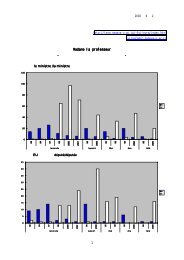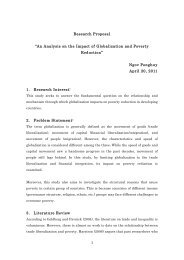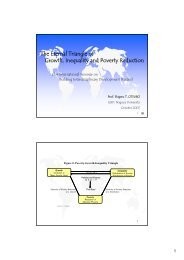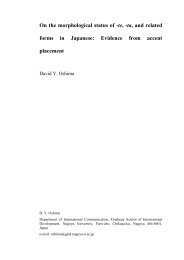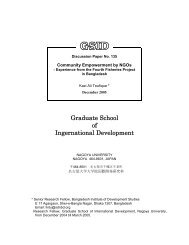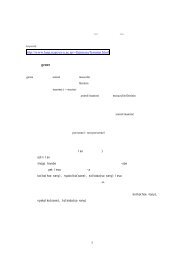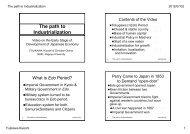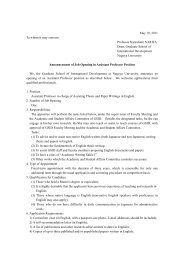Report
Report
Report
You also want an ePaper? Increase the reach of your titles
YUMPU automatically turns print PDFs into web optimized ePapers that Google loves.
CONSTRUCTION AND RELATED ENGINEERING SERVICES 115<br />
ever, a market is emerging in an area nearby the Male<br />
capital island. The World Bank suggests that the government<br />
needs to become a facilitator/regulator instead of<br />
land provider. The absence of a vibrant private land<br />
market aggravates the access-to-finance issue, especially<br />
since banks still focus on collateral based lending rather<br />
than cash flows. In this regard, the World Bank suggests<br />
that the government should promote the establishment<br />
of modern movable assets registry in order to encourage<br />
using such assets as collateral.<br />
One of the major challenges for the government is<br />
how to attract investments within the structure of an<br />
increasingly competitive market economy while<br />
protecting the vulnerable groups. This is endorsed by<br />
the government’s Vision 2020. Land and housing<br />
markets are an integral component of a dynamic market<br />
economy, which was recognised in the sixth National<br />
Development Plan. This will require, as the World Bank<br />
suggests, a paradigm shift in the role of the government<br />
from being a direct provider to being a facilitator and<br />
a regulator by allowing the development of housing<br />
markets in the private sector and local communities<br />
(The World Bank 2006). Presently, no comprehensive<br />
regulatory framework for housing and urban management<br />
exists in the Maldives.<br />
The Maldives is an import dependent country and<br />
it requires modern construction services to support its<br />
thriving tourism sector and other needs of the country.<br />
WTO commitments in this sector help the country in<br />
better articulate its import requirements. This will also<br />
bring in transparency and predictability in the system<br />
from which both the Maldives as an importing country<br />
and others as exporting countries would benefit. Also<br />
since its trade regime seems to be relatively liberal, there<br />
is no reason why the Maldives should not undertake<br />
wider and deeper commitments in this sector given its<br />
very strong import interest. At least under the SAFTA<br />
it must do so. This will help the country immensely by<br />
accessing cheaper services from the region and may lead<br />
to enhancement of the skill levels of the labour force.<br />
Bhutan<br />
Although as part of its accession negotiations Bhutan<br />
has already submitted its offer in services, the same<br />
has not been made available for the use of public.<br />
However, there is evidence suggesting that Bhutan has<br />
made relatively liberal commitments in services. It<br />
should be a repeat of Nepal’s story. Thus it is expected<br />
that Bhutan might have undertaken commitments in<br />
the construction and related engineering services sector.<br />
According to the restricted document available with<br />
WTO members, Bhutan has offered to undertake<br />
commitments for warehouses and industrial buildings<br />
(CPC 51230) under the sub-sector – general construction<br />
work for buildings. It has also proposed to make<br />
commitments for highways (except elevated highways,<br />
streets, roads, railways and airfield runways (CPC<br />
51310); bridges, elevated highways, tunnels and subways<br />
(CPC 51320); long distance pipelines, communication<br />
and power lines (cables) (CPC 51340); local<br />
pipelines and cables, ancillary works (CPC 51350); and<br />
construction, mining and manufacturing (CPC 51360).<br />
Thus in two sub sectors of the construction sector<br />
Bhutan has taken broad commitments and coverage<br />
wise it is by no means less than that of Pakistan. Further,<br />
in the Market Access column, under Modes 1 and 2<br />
there are no restrictions inscribed. Under Mode 3 the<br />
limitations include services to be provided through<br />
incorporation where the foreign investor equity shall<br />
be limited to a maximum of 49% and jobs below $11<br />
million to be reserved for the domestic industry. Mode<br />
4 remains unbound and refers to the horizontal section.<br />
In the National Treatment column, Modes 1, 2, and 3<br />
have got no restrictions and the status of Mode 4 is<br />
same as in the Market Access column.<br />
In its horizontal section, Bhutan has inscribed<br />
certain limitations in the Market Access column under<br />
Mode 3 that in order to establish a new commercial<br />
presence in Bhutan the minimum size of foreign<br />
investment shall be $0.5 million, foreign investor’s<br />
equity holding limited to 70%, and the business must<br />
also be incorporated in Bhutan. The investment shall<br />
be governed by sector specific policies and procedures<br />
as established in the sectors included in this schedule.<br />
Also Mode 3 is unbound for measures regulating<br />
publicly funded services including with respect to<br />
national treatment. In the National Treatment column<br />
there are some limitations, which include foreign<br />
investors required to foster transfer of technology,<br />
introduction of management skills and provide training<br />
and employ Bhutanese nationals at all levels in the<br />
enterprise. Moreover, the shares held by foreign<br />
nationals and foreign juridical persons in locally<br />
incorporated companies are not transferable without<br />
prior permission by the Government of Bhutan.<br />
The share of construction sector in the Bhutan’s<br />
GDP has increased from 7.9% in 1980 to 12.1% in<br />
2001 (UNESCAP 2003:191). However, this has been<br />
largely attributable to the construction of hydropower<br />
projects. In Bhutan the regulatory body is the construction<br />
development board (CDB) – an interagency of the<br />
Royal Government of Bhutan – that regulates the






